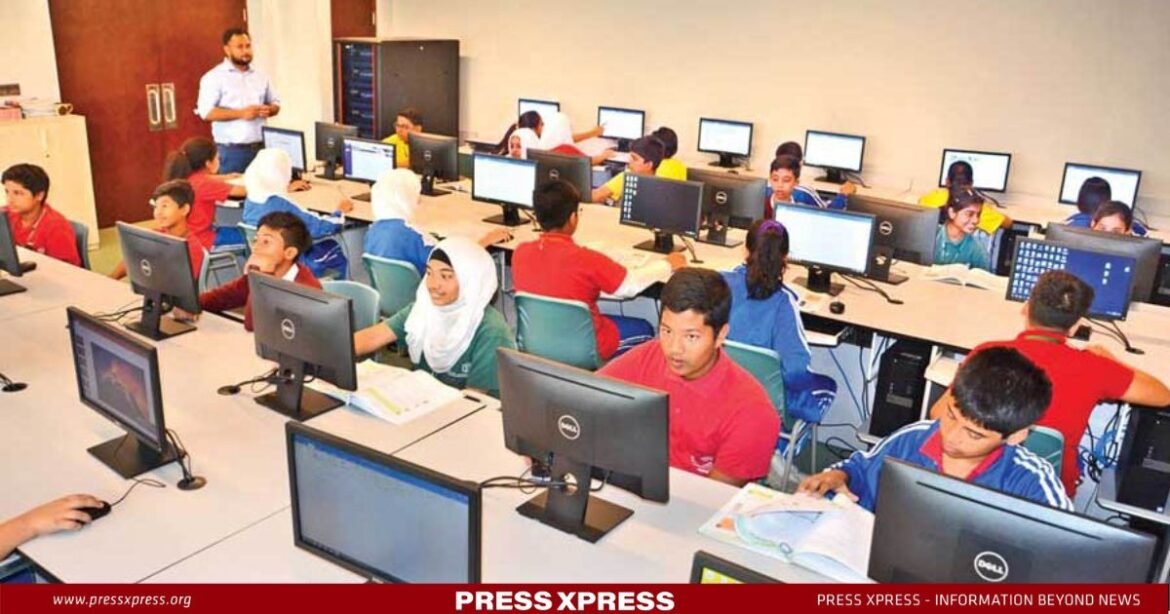Key highlights:
- Bangladesh boasts the most affordable mobile data internet in Asia per GB and ranks 8th globally for affordability in 2021, according to Cable.co.uk.
- Since 2009, over 500,000 secondary and higher secondary level teachers have received ICT training, with 255 ICT teacher positions filled in government colleges.
- ICT-friendly buildings under the private colleges’ development project have been completed in 1,473 out of 1,610 selected colleges.
- Within the e-campus framework, 243 courses in diploma in engineering and vocational syllabus have been integrated for implementation in Bangladesh.
- With support from a2i, a total of 1886 classes have been conducted via centralized management on Facebook Live.
The students of today have bridged the gap with digital technology more closely than any preceding generation. Although the momentum of the digital revolution hinted at the inevitability of digital learning, not everyone was prepared to be the pioneer. Concerns regarding insufficient teacher-student engagement, diminished social interactions, technological or internet challenges, and unequal privileges have persistently served as formidable counterarguments.
You can also read: How Bangladesh Revolutionized Primary Education?
However, the COVID-19 outbreak has brought about unforeseen changes, surpassing what seemed impossible at the beginning of 2020. Throughout the lockdown, the utilization of video communication services like Zoom and Google Meet has witnessed a notable surge, especially among students involved in remote learning in schools, universities, and vocational institutions.
Talking about ‘Digital Education,’ this idea revolves around creating engaging e-learning environments in schools, alongside facilitating distance learning via television, radio, mobile devices, and the internet. The government, through its ‘Vision 2021 Masterplan,’ envisioned a ‘Digital Bangladesh,’ wherein information and communication technology play pivotal roles in education, healthcare, and overall socioeconomic development. Since its inception in 2009, Bangladesh has implemented policies aimed at the digitalization of education.
Bangladesh takes pride in offering the most budget-friendly mobile data internet per GB in Asia and securing the 8th spot globally for its affordability in 2021, according to the Cable.co.uk report.
Integrating Digital Technology from High School to Higher Learning
Upazila ICT training and resource Centres have been established, and an E-monitoring system has been introduced in all government primary schools. Since 2009, around 500,000 secondary and higher secondary level teachers have undergone ICT training, and 255 ICT teacher positions were created and filled in government colleges. The curriculum on Information and Communication Technology has been introduced from class IV and made compulsory up to the higher secondary level.
Additionally, e-learning modules for classes VII, VIII, IX, and X are available online, with digital technology integrated into the class VI and VII curricula starting in 2023.
Under the private colleges’ development project, ICT-friendly buildings have been completed in 1,473 out of 1,610 selected colleges. Since 2009, a total of 33,285 multimedia classrooms and 11,307 computer labs have been set up in selected educational institutions. Furthermore, 710 ICT learning centers have been established in selected educational institutions.
In terms of research, specialized high-tech computer labs have been established in 33 public and private universities. KUET now houses both the Sheikh Kamal IT Training and Incubation Center and the Sheikh Kamal IT Training and Business Incubation Center.
The Digital Monitoring System (DMS) app oversees field office and educational institution inspections, and digital content for primary and class 6 textbooks has been developed and uploaded.
Advancements in ICT in Education
Private Colleges’ Development Project:
- Number of colleges selected: 1,610
- ICT-friendly buildings completed: 1,473
Multimedia Classrooms and Computer Labs:
- Multimedia classrooms: 33,285
- Computer labs: 11,307
ICT Learning Centers:
- Number established: 710
Teacher Training in ICT:
- Number of teachers trained: 500,000
- Training period: Since 2009
- ICT Curriculum introduction: From class IV to higher secondary
Specialized Computer Labs in Universities:
- Number of universities with labs: 33
- Focus: Research and high-tech
ICT Teacher Positions in Government Colleges:
- The number created and filled: 255
Pioneering Steps in Digital and Vocational Learning
The digitalization of vocational and madrasa institutions in Bangladesh has undergone significant developments since 2009, reflecting the country’s commitment to modernizing education and bridging the digital divide. Amid the challenges posed by the COVID-19 pandemic, the education department has implemented various strategies to ensure the uninterrupted delivery of vocational education.
Utilizing support from a2i, a total of 1886 classes have been conducted via the centralized management of Facebook Live. Initiatives have been taken to actively involve students in the educational process through the submission of assignments.
To sustain the provision of education through a blended approach within the jurisdiction of the vocational education department, an e-campus, designated as a Learning Management System (LMS), has been established. A total of 850 teachers have undergone training to create e-courses using the LMS.
The development of a Learning Management System (LMS) has facilitated the organization of examinations in adherence to COVID-19 health guidelines, with subsequent result announcements.
Within the e-campus framework, 243 courses in diploma in engineering and vocational syllabus have been integrated for implementation in Bangladesh. Under the guidance of the esteemed Minister of the Ministry of Education, a task force known as the “Blended Education in Vocational Learning” has been instituted to realize market-oriented skill development and ensure workplace preparedness.
The National Skills Development Policy of 2011 has incorporated the national vocational and financial qualification framework (Skill levels 1 to 6). Notably, a qualification framework was absent at the higher education level. Consequently, a universal competency framework has been established in the country, aligning with the qualification frameworks of various countries worldwide, encompassing different streams and levels of education and training.
This national qualification framework is comprised of two components on a scale of 1 to 10. The first part encompasses skill levels 1 to 6, including SSC (Vocational) to Diploma in Engineering, while levels 7 to 10 encompass undergraduate to Ph.D. degrees. In three domains – Knowledge, Skills, and Attitude – each level is delineated and explained. Simultaneously, provisions for transitions between domains or levels (Learning Pathways) have been incorporated. Adherence to this competency framework ensures that education and training align seamlessly with international standards.
Vocational e-learning
Facebook Live Classes (Utilizing a2i support):
- Total Classes Conducted: 1886
E-Campus (Learning Management System – LMS):
- Teachers Trained: 850
- Courses Integrated: 243
Blended Education Task Force:
- Task Force Establishment: “Blended Education in Vocational Learning”
National Skills Development Policy (2011):
- Vocational and Financial Qualification Framework (Skill Level 1 to 6)
Universal Competency Framework:
- Components: Two (Scale 1 to 10)
- Skill Levels 1 to 6: SSC (Vocational) to Diploma in Engineering
- Skill Levels 7 to 10: Undergraduate to Ph.D. degrees
- Domains: Knowledge, Skills, and Attitude
In conclusion, Bangladesh has effectively embraced the digital era in education, thereby establishing the groundwork for a future where learning transcends traditional constraints. Moreover, despite encountering technological challenges, the COVID-19 outbreak expedited the uptake of digital tools, ushering in remarkable transformations within the education sector. As a result of the nation’s steadfast dedication to innovation and inclusivity in education, it now stands as a frontrunner in the worldwide digital learning landscape.
Expart Opinion
In your opinion,how the overall development in vocational education has improved lives of people in Bangladesh?
The evolution of digital vocational education in Bangladesh has seen remarkable growth, marked by the widespread adoption of online platforms, dynamic learning materials, and tech-driven resources. This transformation enhances accessibility and effectiveness, fostering a more interactive and sophisticated approach to vocational training nationwide.
Md Moshiur Rahman
Assistant Professor (CSE)
BANGLADESH OPEN UNIVERSITY



